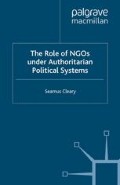Abstract
Indonesia’s organised voluntary sector has a history dating back to the beginning of the twentieth century. These social welfare organisations were established in the health care, social welfare and formal education sectors in response to the government’s top-down development approach which had only a limited impact on the poor in a country of enormous geographic and cultural diversity. By the 1960s, new organisations motivated by ideals of self-reliance and emphasising development emerged which began to replace the welfare orientation of the earlier organisations. According to the US PVO PACT, these organisations aimed to:
bridge the gap between the needs of that [disadvantaged] citizenry and the goals of national government programmes. They began by responding to the diverse problems and aspirations articulated at the grassroots level, and then carving out development roles not assumed by government or business.
(Farrington and Lewis with Satish and Miclat-Teves, 1993)
Access this chapter
Tax calculation will be finalised at checkout
Purchases are for personal use only
Preview
Unable to display preview. Download preview PDF.
References
George J Aditjondro: ‘The dams of Indonesia. The rhetoric of “preventing another Kedung Ombo”’, Impact, June 1991.
Carmel Budiardjo: ‘Militarism and repression in Indonesia’, Third World Quarterly, Vol. 8, No. 4, October 1986, pp. 1219–38.
Malcolm Caldwell and Ernst Utrecht: Indonesia: an alternative history, Alternative Publishing Co-operative Ltd, Sydney, 1979.
Down to Earth various numbers, Survival International, London.
John Farrington and David J. Lewis with S. Satish and Aurea Miclat-Teves (eds): Non-Governmental Organisations and the State in Asia. Rethinking roles in sustainable agricultural development, Routledge, London, 1993.
Richard Holloway (ed.): Doing Development. Governments, NGOs and the rural poor in Asia, Earthscan in association with CUSO, London, 1989.
Paul Mosley, Jane Harrigan and John Toye: Aid and Power: The World Bank and Policy-Based Lending, Volume 1, Routledge, London, 1991.
Paul Mosley, Jane Harrigan and John Toye: Aid and Power: The World Bank and Policy-Based Lending, Volume 2, Case Studies, Routledge, London, 1991.
Aswab Mahasin: ‘Culture and power: changing the mirage’, Prisma, No. 46, Jakarta, 1989.
Lucien Pye: Asian Power and Politics, Belknap-Harvard, Cambridge, Mass. 1985.
Julie Southwood and Patrick Flanagan: Indonesia: Law, Propaganda and Terror, Zed Press, London, 1983.
Ulf Sundhaussen: ‘The problem of succession in Indonesia’, in Third World Affairs, Third World Foundation for Social and Economic Studies, London, 1988, pp. 267–74.
Lek Hor Tan: ‘Case studies in Asian censorship’, in Third World Affairs, Third World Foundation for Social and Economic Studies, London, 1988, pp. 255–6.
Peter van Tuiji: ‘Conditionality for whom? Indonesia and the dissolution of the IGGI: the NGO experience’, in Andrew Clayton (ed.): Governance, Democracy and Conditionality: What Role for NGOs?, INTRAC, Oxford, 1994.
Michael RJ. Vatikiotis: Indonesian Politics under Suharto: Order, Development and Pressure for Change (revised), Routledge, London, 1994.
Author information
Authors and Affiliations
Copyright information
© 1997 Seamus Cleary
About this chapter
Cite this chapter
Cleary, S. (1997). In Whose Interest? Authoritarian Social Organisation, NGO Advocacy Campaigns and the Poorest: an Exploration of Two Indonesian Examples. In: The Role of NGOs under Authoritarian Political Systems. International Political Economy Series. Palgrave Macmillan, London. https://doi.org/10.1057/9780230375086_2
Download citation
DOI: https://doi.org/10.1057/9780230375086_2
Publisher Name: Palgrave Macmillan, London
Print ISBN: 978-1-349-39889-8
Online ISBN: 978-0-230-37508-6
eBook Packages: Palgrave Political & Intern. Studies CollectionPolitical Science and International Studies (R0)

